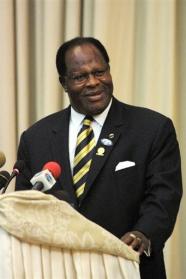A law expert has expressed the need to remove secrecy on salaries and benefits of the president and vice president in order to promote transparency and accountability in the two high offices.
The call is in line with Section 82 of the Republican Constitution which states the the president, first vice president and second vice president shall receive such salary, allowance or pension as may, from time to time, be determined by an act of Parliament in consultation with president and shall have such adequate number of residences and personal staff, at state expense, as an act of parliament may prescribe.
“The remuneration of the president , vice president is not meant to be a secretive affair and this is in line with our Constitution’s demand for transparency and accountability.
“Transparency at that high level of government is likely to trigger further transparency in the lower levels of government. The principle, basically, is to provide sufficient remuneration to the president while at the same time not creating an obscene charge on the Consolidated Fund,” Chancellor College law lecturer, Mwiza Nkhata, observed.
He said the act of parliament that was put in place was the Presidents (Salaries and Benefits) Act of 1994.
Nkhata observed that section 82 was important in terms of its explicit stipulations on the remuneration of the president and deputies.
“Bearing in mind the importance of these offices, it is comforting that the Constitution has a direct provision regulating remuneration with regard to the Presidency. The idea here is to enhance transparency and accountability on the part of the Presidency.
“In line with the whole approach of reading the Constitution as one whole, section 82 must be read closely with section 88A of the Constitution. Section 88A also requires the President and all members of Cabinet to fully disclose their assets, liabilities and business interests including those of their spouses or those business interests held on their behalf within 3 months of election or appointment,” he noted.
According to Nkhata, under section 88A the disclosure is supposed to be made in a written document that must be submitted to the Speaker of the National Assembly.
He indicated that if presidents and ministers properly declared their assets and business interests within the prescribed time limit it would be very easy to detect instances of unjust enrichment.
“It must be recalled that most public officers are in charge of enormous state re¬sources and there is always the likelihood that the holders of such offices may unjustly enrich themselves in the process of occupying these public offices. With regard to the Presidency and ministers, if the nation is allowed to know their wealth before they assume office or immediately after they assume office it would be easy to detect abuse of office and unjust enrichment because their official remuneration is not a secret,” he noted.
Another law expert Edge Kanyongolo said the presidents (salaries and Benefits) Act was quite important because it seeks to prevent presidents and vice presidents from claiming excessive perks, while at the same time also securing those benefits against illegal withdrawal or denial “as was the case when the government at one time withdrew benefits from sitting vice presidents Cassim Chilumpha and Joyce Banda.”
Solicitor General Anthony Kamanga said in an interview that the salaries and benefits of the president and vice president were not a secret.
“The allocation of the president is always discussed in parliament. The information is there on how much the president is getting, anyone interested can find,” Kamanga said.
Its only former president Bakili Muluzi who once revealed his salary at the time when he was in power.

.jpeg&w=60&q=100&h=60)




.jpeg&w=60&q=100&h=60)





